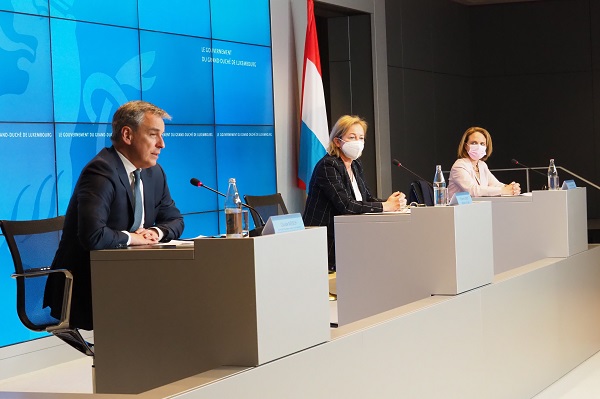 L-R: Paulette Lenert, Minister of Health; Claude Meisch, Minister of Education, Children and Youth, Minister for Higher Education and Research; Corinne Cahen, Minister of Family Affairs, Integration and the Greater Region;
Credit: MENEJ
L-R: Paulette Lenert, Minister of Health; Claude Meisch, Minister of Education, Children and Youth, Minister for Higher Education and Research; Corinne Cahen, Minister of Family Affairs, Integration and the Greater Region;
Credit: MENEJ
As part of national efforts in response to potential shortages in the healthcare sector, the University of Luxembourg will be offering various new bachelor programmes related to nursing and midwifery from next year onwards.
On Monday 3 May 2021, Luxembourg's Minister of Health, Paulette Lenert, the Minister of Education, Children and Youth and for Higher Education and Research, Claude Meisch, and the Minister of Family Affairs, Integration and the Greater Region, Corinne Cahen, presented the reform of the exercise and training of certain categories of health professions.
In line with the government's objective of developing university-level medical studies in Luxembourg and improving the attractiveness of the medical and health professions, as well as in response to the risk of shortages in the sector in future, it has become essential to ensure the attractiveness of training for health professions in general and in particular for nurses responsible for general care, specialised nurses and nursing assistants.
Health Minister Paulette Lenert pointed out: “The practice of these professions has been facing major developments for several years and requires from these professions specific skills both in terms of the technical nature of the acts carried out for the implementation of treatments, and at the level of expertise in care”.
To meet the public health challenges that Luxembourg must face in the next fifteen years in terms of potential shortages and to better manage the reorganisation of medical and nursing resources, the Government Council has approved the broad lines of the reform of the exercise and training of certain categories of health professions in Luxembourg.
These measures were developed and proposed by an interministerial committee set up in 2020 and composed of representatives of the Ministry of Health, the Directorate of Health, the Ministry of Family Affairs, Integration and the Greater Region, the Ministry of Social Security, the Ministry of Education, Children and Youth and the Ministry of Higher Education and Research.
Minister Corinne Cahen noted: “These professions are not fixed in a specific knowledge or activity, but they are constantly evolving, which makes them attractive and exciting. The health professional exercises much more than a profession, it is a passion for the service of others”.
The training of health professions in Luxembourg is being reorganised to offer a progressive and coherent course which leads to several levels of qualification. The step-by-step structure and the facilitation of bridges guarantee flexible progression while ensuring quality training, from the nursing section of secondary education to the bachelor's degree.
The newly created courses at the University of Luxembourg include:
- A general care nursing bachelor's programme, which will start in the academic year 2023/2024. The programme will run for three years and will be accessible to holders of a secondary school diploma.
- Four specialised nursing bachelor programmes (180 ECTS) in the following specialties: surgical medical technical assistant; anesthesia and intensive care nurse; paediatric nurse; psychiatric nurse. These programmes will start in the academic year 2022/2023 or 2023/2024 and will be accessible to holders of a BTS qualification in general care nursing and to anyone else with a recognised diploma in general care nursing.
- Two bachelor programmes for midwifery and medical-technical radiology assistant training, which will begin in the academic year 2023/2024. These programmes will be accessible to holders of a secondary school diploma.
In addition, the aim is to set up a nursing “plus” bachelor programme, i.e. a three-year course leading to a diploma in general care nursing, followed by a one-year course leading to a nursing “plus” diploma. This new training course will include additional, more detailed assignments in response to a growing demand for highly specialised nursing care.
Minister Claude Meisch stressed: "Teaching the professions of general care nurses and certain nursing specialisations at the university level is an important step for the health sector, and for the University of Luxembourg: it will make it possible to train more health professionals in Luxembourg to meet the growing demand of the country". He added that the Lycée Technique pour Professions de Santé (LTPS) "will remain an important player in the training of professionals in this sector and, thanks to the synergies between the LTPS and the University of Luxembourg, we will succeed in offering a training course progressive and coherent which leads to several levels of qualification".
The reorganisation of the training path for health professionals in higher education will be subject to an evaluation in 2028. At this time, the need to set up new profiles (health care technician, advanced practice nurse at Master's level) will also be analysed.
The respective ministers concluded: “This crisis has underlined more than ever the importance of the health professions in the fight against the pandemic and drew attention to their role as an essential pillar in our health system. On this occasion, we would like to thank them for their tireless commitment and their remarkable solidity".









